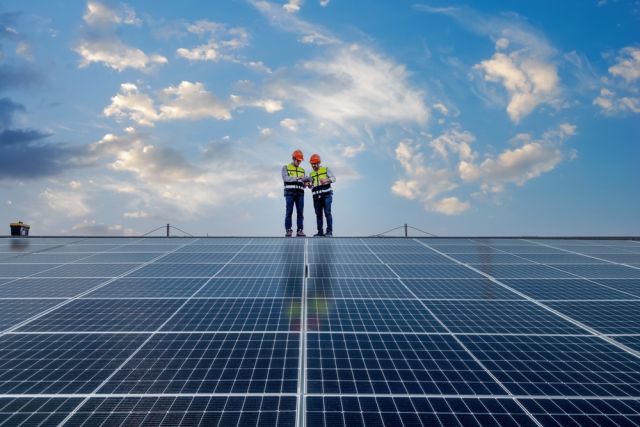
A group of solar manufacturers want the U.S. to impose tariffs to ensure panels and modules imported from Southeast Asia are priced at fair market value. (Source: Shutterstock)
A group of U.S. solar manufacturers have filed antidumping and countervailing duty petitions with the federal government, requesting an investigation on potential illegal trade practices by four Southeast Asian countries.
The petitions were filed by the American Alliance for Solar Manufacturing Trade Committee, which includes member companies First Solar, Qcells, REC Silicon and others, with the U.S. International Trade Commission (ITC) and the U.S. Department of Commerce, according to Washington D.C.-based law firm Wiley Rein LLP, which represents the group.
The petitioning companies, which also include Convalt Energy, Meyer Burger, Mission Solar and Swift Solar, claim mainly China-headquartered companies operating in Cambodia, Malaysia, Thailand and Vietnam are flooding the U.S. market with panels believed to be sold at prices below the cost of production.
“This is resulting in high volumes of dumping on global markets including the U.S., injuring our domestic producers,” said Tim Brightbill, co-chair of Wiley’s International Trade Practice and lead counsel to the petitioner, in an April 24 release. “We are seeking to enforce the rules, remedy the injury to our domestic solar industry and signal that the U.S. will not be a dumping ground for foreign solar products.”
The petitions were filed as the U.S. works to bolster its domestic solar manufacturing sector and reduce its reliance on imports. Incentives made available in the Inflation Reduction Act have played a big part in many solar manufacturers’ decisions to expand in the U.S. Arizona-based First Solar and Qcells, the solar division of South Korean conglomerate Hanwha, are among them.
First Solar has several major projects underway in the U.S., including new manufacturing facilities in Alabama and Louisiana, plus an expansion project at its Ohio facility. Qcells in 2023 said it planned to invest more than $2.5 billion to grow its manufacturing capacity in the U.S.
Brighthill said the “manufacturing renaissance is being threatened by China’s industrial policy, which has led to massive subsidization in China and Southeast Asia.”
The companies behind the petition want AD/CVD duties imposed to ensure the products are priced at fair market value. The petitions concern crystalline silicon photovoltaic cells and modules.
The petitions were filed less than a year after the Commerce Department ruled that Chinese solar panel manufacturers were selling their products through Cambodia, Malaysia, Thailand and Vietnam to avoid tariffs. However, the Biden administration waived the tariffs for two years. The moratorium ends in June.
While the U.S. has taken steps to bolster domestic manufacturing to create jobs and enable the transition to additional lower-carbon energy, solar developers have relied on inexpensive panels to improve project economics.
Speaking before news of the petitions’ filing on an earnings call April 23, NextEra Energy CEO John Ketchum said “We find it hard to believe that any panels are being dumped into the U.S. market under the law. … The U.S. is the most expensive solar panel market in the world. It’s two to three times higher than any other market in the world. And, if panels were being dumped, that could not be the case.”
RELATED
Solar Panel Tariff, AD/CVD Speculation No Concern for NextEra
Several energy industry groups issued a joint statement following news of the petitions’ filing, stating it creates uncertainty. The Solar Energy Industries Association, American Clean Power Association, Advanced Energy United and American Council on Renewable Energy said the Advanced Manufacturing Tax Credit and other incentives are driving investment in U.S. solar manufacturing.
“America’s clean energy industry is urging the Biden administration to consider alternative solutions to address the petitioners’ concerns so that we can uplift American manufacturers and maintain a thriving clean energy economy across the value chain,” the groups said.
The Commerce Department will decide whether to start investigations within about 20 days. The ITC is expected to reach a preliminary determination within about 45 days. The investigative process is expected to take about a year, with a final outcome likely by spring 2025.
Recommended Reading
US Oil Rig Count Rises to Highest Since June
2025-04-04 - Baker Hughes said oil rigs rose by five to 489 this week, their highest since June, while gas rigs fell by seven, the most in a week since May 2023, to 96, their lowest since September.
Black Gold, LGX Find Multiple Pay Zones in Western Indiana
2025-04-04 - Black Gold Exploration Corp. and LGX Energy Corp. are working to start production at the Fritz 2-30 oil and gas well in Indiana within 60 days.
Pennsylvania City to Turn Coal-Powered Plant into Gas-Fired Data Center Campus
2025-04-03 - Construction on the Homer City Generating Station is expected to start in 2026.
BP’s Cypre Development Off Trinidad and Tobago Delivers First Gas
2025-04-03 - BP Trinidad and Tobago said the Cypre development is projected to deliver approximately 45,000 boe/d at peak.
Sitio Fights for its Place Atop the M&R Sector
2025-04-02 - The minerals and royalties space is primed for massive growth and consolidation with Sitio aiming for the front of the pack.
Comments
Add new comment
This conversation is moderated according to Hart Energy community rules. Please read the rules before joining the discussion. If you’re experiencing any technical problems, please contact our customer care team.





